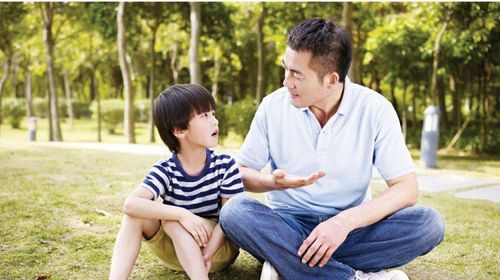This is an automatically translated article.
A child's fear of abandonment is often caused by one or several loss events in the past such as the death of a parent or separation or divorce. What are the symptoms of abandoned children?
1. What is an abandoned child?
Child abandonment is a condition in which a child fails to provide or meet basic emotional, educational, physical development, and medical needs. Neglect differs from child abuse in that it often occurs without the intention of harming the child.
The different types of neglect are:
Developmental Neglect of the Child : Includes failure to provide adequate food, clothing, shelter, supervision and protection from possible harm. out. Emotional neglect of a child: The failure to provide affection, love, or other forms of emotional support to a child. Educational Neglect: The failure to send a child to school, to fail to secure attendance, or to provide homeschooling for a child. Medical Neglect: The failure to ensure that a child's medical needs are met, such as appropriate care or necessary treatment for traumatic conditions or physical or mental disturbances. However, failure to provide preventive care such as vaccinations and regular dental check-ups would not normally be seen as abandonment.
2. Manifestations when children are abandoned
At each age, children will show signs of abandonment such as:
Children under 2 years old: At this age, when abandoned, children will have eating disorders (no feeding, vomiting), sleep disturbances (baby crying at night, startling). Babies are susceptible to infections (respiratory infections, diarrhea) due to stress that weakens the immune system. Children from 3-5 years old: Children abandoned at this age will show signs of regression such as stopping talking even though they knew how to talk before, poor concentration, making it difficult for teachers to accept children into kindergarten. . Children 6-10 years old: At this stage, children will have difficulties in learning because of poor memory, lack of sleep, nightmares, sleepwalking. Adolescents: If abandoned during this period, young children are often passionate about computer games, accessing the Internet, addicted to chat, like to make friends in the virtual world to have friends to talk to, and practice smoking. , drinking, drug use, dropping out of school, depression, threatening suicide.

Trẻ bị rối loạn giấc ngủ, khóc đêm là biểu hiện khi trẻ bị bỏ rơi
3. How dangerous are abandoned children?
Fear of losing loved ones or loved ones is a part of life. However, if that fear can become severe, permanent to the point of obsession, it can negatively affect life. This can lead to many serious consequences, making it impossible for children to build good relationships and lead a peaceful and comfortable life.
A child who has experienced the pain of abandonment is more likely to experience difficulty or psychological stress because of the constant fear that the tragedy will happen again. Like a child who has been abandoned or not cared for by a parent or caregiver, often has a moody personality, cries or sulks, gets angry easily, and becomes irritable. This condition, left untreated, can persist into adulthood, even throughout the child's life. Such impulsive or irritable behavior will make those around them shy away from contact and avoid the child.
Parental abandonment doesn't have to be in two different places, it can happen both physically and mentally. A parent who doesn't show affection to a child, who is often cold or indifferent is also an act of abandonment, even if they live under the same roof.
Abandoned children will constantly wonder why their parents abandoned them. Children constantly wonder:
What did I do wrong to make my parents treat me like this? Why don't my parents love me? Why do parents always pamper their sister or brother more than themselves? ... And then you will always be obsessed with finding the answers to these questions. The child is afraid that it is because he is not smart, not cute, or thinks he is abnormal, so the parents do that. The false beliefs that one is not worthy of parental love can be carried by the child for the rest of his life. This can lead to children not daring to make friends, afraid of closeness with people and having difficulty in all relationships.
Worse, some abandoned children may have distorted thoughts that they need to protect themselves from any pain at all costs. Later, when these children grow up, they can become difficult adults, always living with the thought that it is better to leave someone or end a relationship first, than to let them leave. fall yourself.
In many cases, a child's fear of abandonment is strongly linked to post-traumatic stress disorder (PTSD). A tragic accident that has resulted in the loss of loved ones, or an unsafe living environment - where a child has been abused both physically and mentally - can cause trauma. Severe psychological trauma to the child, including the fear of abandonment.
Trauma can occur in children who have to live in a suffocating home environment such as being emotionally teased by relatives, or having too high expectations from their parents. Or children who live in families where parents also have psychological problems, exhibiting possessiveness or clinging to the child as if their worth is determined solely by their child's success or excellence. .
Fear of abandonment becomes severe and prolonged and has a negative impact on a child's self-esteem. Many studies have shown that people with low self-esteem are more likely to make friends with people who have similar negative beliefs.
Fear of abandonment and low self-esteem make children distrust anyone, do not dare to believe in life, often feel useless, do not like relationships that are too close or close. Some people will often have to deal with anxiety, depression, or excessive dependence on others, not daring to face other difficulties in life.

Giúp trẻ tái kết nối với xã hội bằng việc đi chơi với bạn bè
4. Psychological rehabilitation for abandoned children
Psychological rehabilitation for abandoned children needs to take place gradually over a long period of time. Parents and other family members have a responsibility to observe and support the children during this time. Here are some measures to help children improve their abandonment mentality.
Do not ignore the unusual signs of your children: You need to care for your baby, show love, do not probe. Regularly talk and suggest so that children can share with you what they are going through. Parents need to really listen and be ready to help children solve problems that they are facing. Encourage social connection: Children who are neglected and become depressed tend to separate themselves from activities they enjoy with their friends. However, this only makes the depression worse. You should cleverly help children reconnect with society by going out, traveling... Strengthening your child's physical health: Mental health and physical health are closely connected. Psychiatric problems in abandoned children are exacerbated by inactivity, poor sleep and poor nutrition. Support your child by creating a positive habit of family fun activities during the holidays. Know when your child needs professional help: When parents have applied the above measures but the condition does not improve, then you can seek help from a psychologist or neurologist. . Currently, Vinmec International General Hospital is building a Pediatric Psychology Clinic with the goal of enhancing mental health care for children. Psychologists at the clinic are responsible for assessing, guiding, supporting and intervening in cases of children with mental health problems.
Pediatric Psychology Clinic owns a team of highly qualified doctors and nurses, knowledgeable about child psychology. Vinmec also pays special attention to the children's play space, helping them to have fun and get used to the hospital's environment, cooperate in treatment, and improve the efficiency of medical examination and treatment.
Pediatric Psychology Clinic with security and sympathy on the top. Families and children can rest assured that the experts at the clinic keep information related to the child and the child's family private.
Please dial HOTLINE for more information or register for an appointment HERE. Download MyVinmec app to make appointments faster and to manage your bookings easily.













